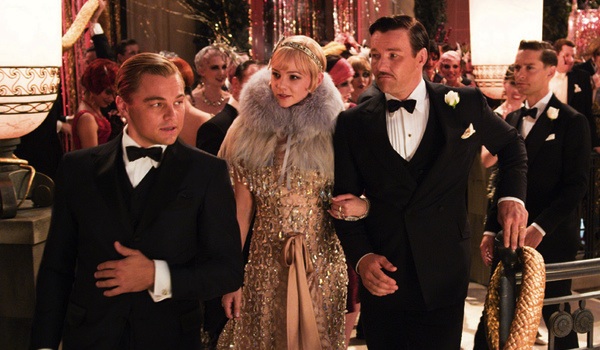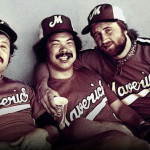The Great Gatsby (2013) Review
You either get Baz Luhrmann or you don’t. He’s a filmmaker set in his ways, and if painterly sets, opulent costumes, sweeping camerawork, glitz, glamour, and some truly odd musical cues are your thing, you probably get Luhrmann and his movies.
I definitely get Luhrmann (count me in the borderline invisible minority of folks who enjoy Australia, his infamous 2008 bomb). And F. Scott Fitzgerald’s The Great Gatsby is on my American literature Mount Rushmore, so perhaps I was predisposed to enjoy Luhrmann’s take on this brilliant text. Or maybe it really is a worthwhile film. It’s too long by 30 minutes, but it’s mostly satisfying and hits all the novel’s themes and big moments with emotional precision and eye-popping beauty.
Our window into this lavish, depraved world is Nick Carraway (Tobey Maguire), an aggressively passive wannabe bonds broker who moves to Long Island a dreamer looking to get a piece of the action during the Roaring Twenties. He finds his place among the social climbers and new money of “West Egg,” while his cousin, Daisy Buchanan (Carey Mulligan), lives large in “East Egg” with her polo-playing, fortune-inheriting husband, Tom (Joel Edgerton).
Tom has a lover in the city, Myrtle Wilson (Isla Fisher), whose husband, auto shop owner George (Jason Clarke), is dimmer than dim. Daisy knows of her husband’s indescretions, and they hurt her deeply, but she lacks an outlet to change or fight back.
Enter Jay Gatsby (Leonardo DiCaprio), the wealthiest man on West Egg and Nick’s next-door neighbor. Gatsby throws the city’s most outstanding parties, yet no one seems to know a thing about the man. “He’s a German spy,” some say. “A murderer,” others call him. As Carraway later finds out, he’s simply a hopeless romantic. He and Daisy were in love years ago—before he became a war hero, before he acquired all his wealth and built a palace all for her. Gatsby asks Nick to arrange a meeting between he and Daisy, and the young man somewhat regretfully obliges.
While Carraway is pretty clearly our lead (and unquestionably our moral compass), Gatsby is the film’s most fascinating individual. His past is shrouded in mystery throughout the film, and his ever present, often hopeless love for one woman drives the film emotionally. Leonardo DiCaprio is perhaps the film’s biggest asset. He’s given us a lot of great performances over the years, many of which are highlighted by controlled bouts of extreme emotion. This one requires him to internalize a lot, but it works, and he plays well off some of the other accomplished men and women—Carey Mulligan, Joel Edgerton, and Tobey Maguire among them—who are all giving solid performances around him.
The film isn’t extraordinarily paced (I’m not sure any Luhrmann film is). Where the first third features the most energy and the final third is the most intense, the second third moves glacially at times and takes us from point A to point B with about three too many detours along the way.
At least Luhrmann nails the period—in his own unique way, of course. Flappers dance and alcohol flows in this world, which is scored to the sounds of Jay-Z, Kanye West, and Lana Del Ray. It’s a very Luhrmann-esque technique, and if it isn’t too jarring for you, you’ll probably be left wanting a little more.
Luhrmann clearly has a great deal of admiration for Fitzgerald’s novel. He leans on Carraway’s narration (which consists mostly of passages taken right from the text) so heavily that you’ll often see the words written elegantly across the screen. It’s a technique that works…and doesn’t—a lot like the film as a whole. While there’s still no definitive screen version of the novel, missing too is a true abomination. It’s hard to screw this incredible story up, and Luhrmann’s take is unique, beautiful, and fun enough to give its missteps a happy pass.

















One Response to The Great Gatsby (2013) Review